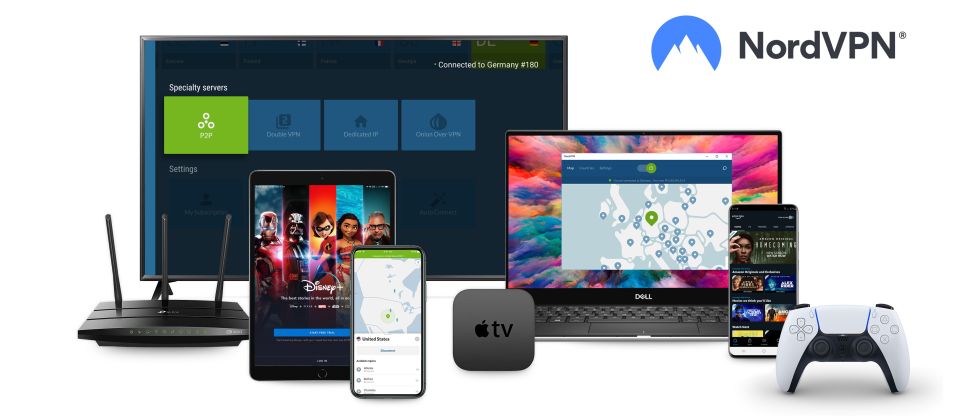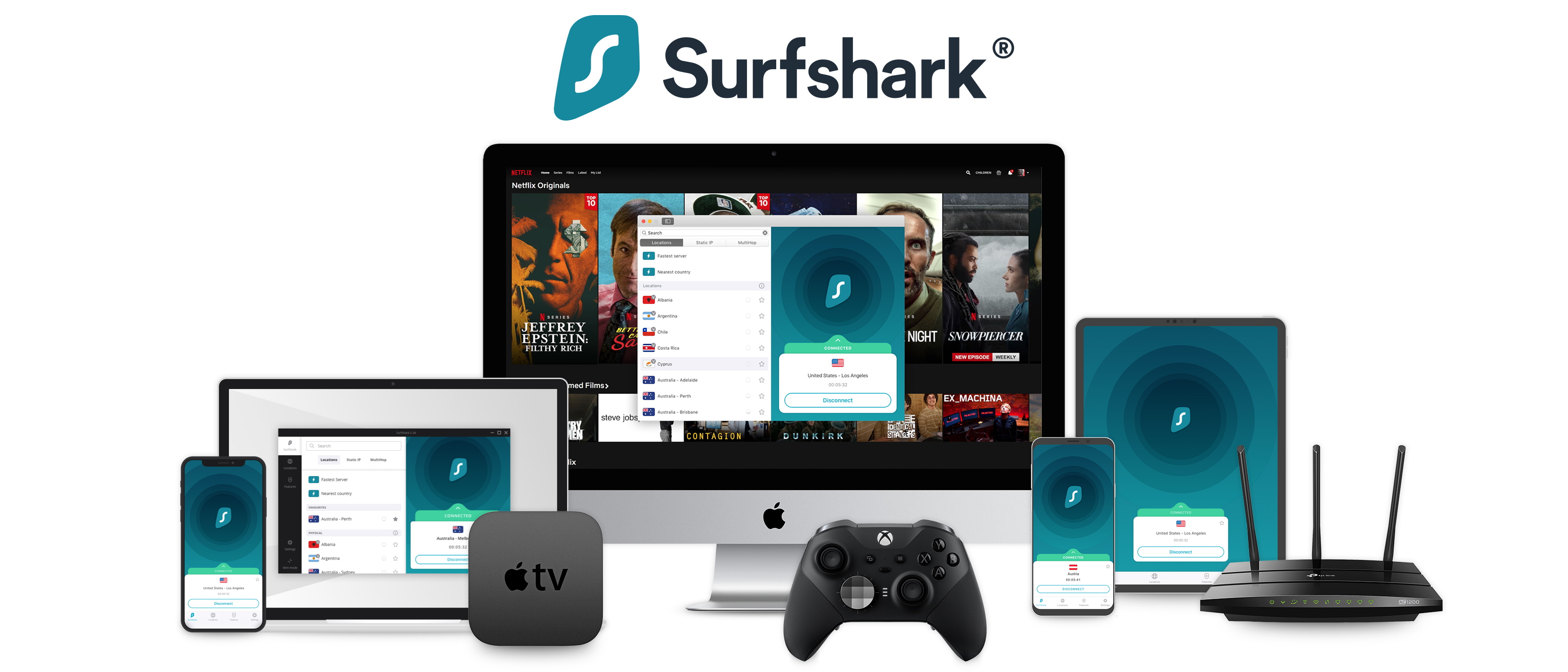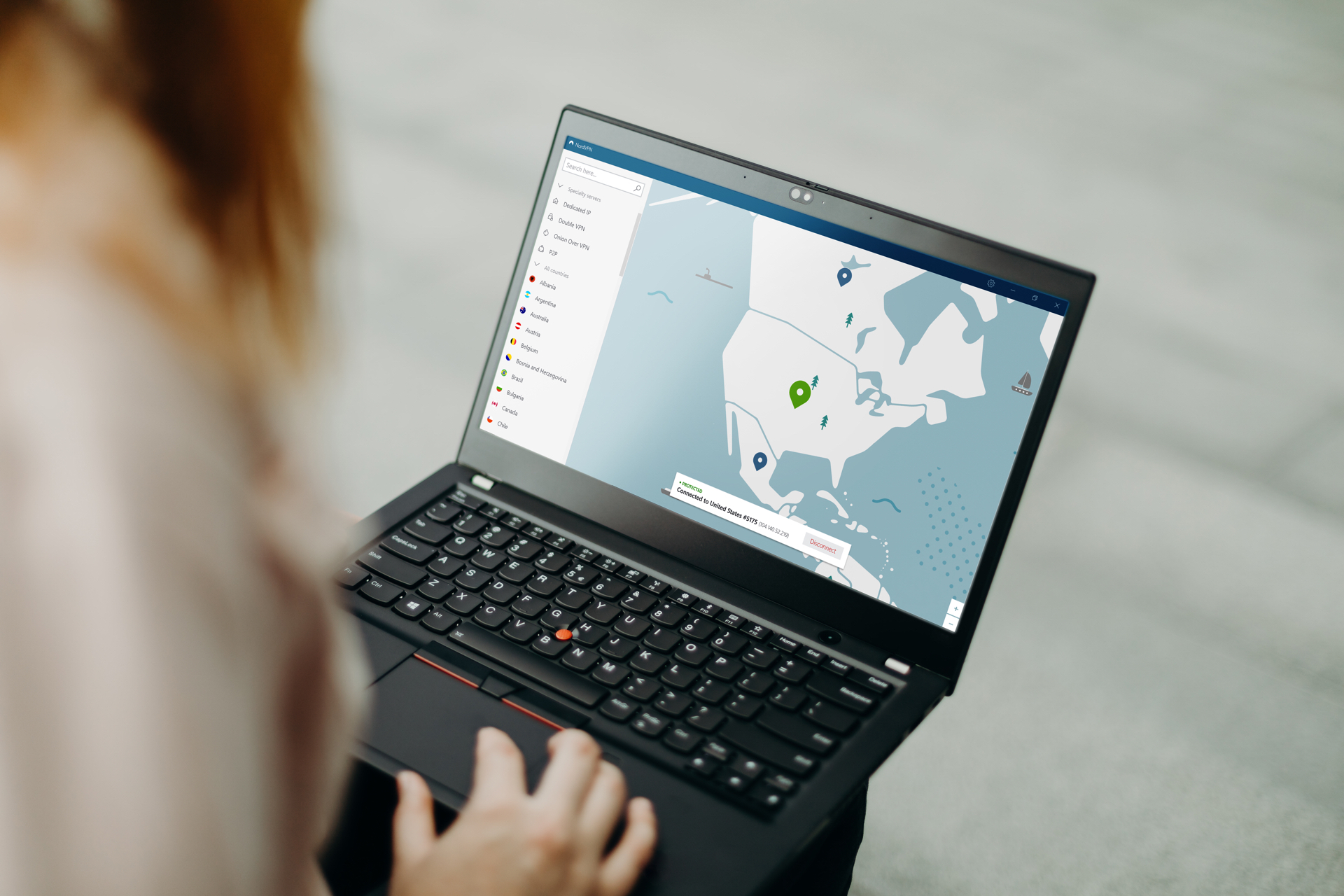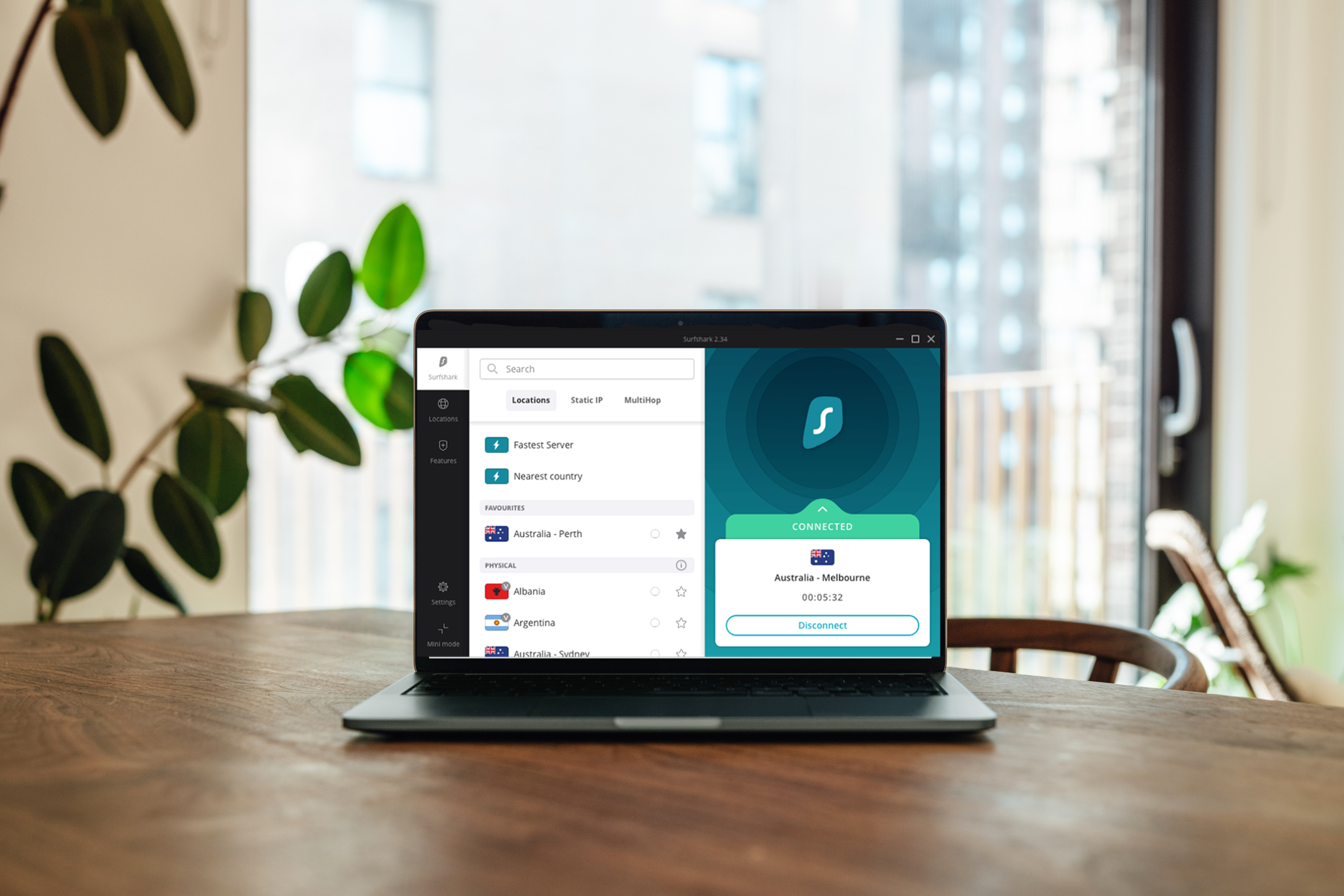NordVPN vs Surfshark: which should you get in 2026?
Sign up for breaking news, reviews, opinion, top tech deals, and more.
You are now subscribed
Your newsletter sign-up was successful

NordVPN is our #1 recommendation overall – and for good reason. It's a user-friendly blend of security and speed, and you don't need to be a tech expert to get started. NordVPN is a great pick for streamers, too, thanks to reliable unblocking power and servers practically everywhere.
Pros
- High-speed servers
- Audited no-logs policy
- Unblocks all streaming sites
- Packed with extras
Cons
- App UI needs polish
- Data breach in 2018

Surfshark proves that a high-quality VPN doesn't need to cost a fortune. For a tiny monthly fee, you'll get industry-standard encryption and a whole host of extra features. Plus, Surfshark gives its users unlimited simultaneous connections to play with.
Pros
- The fastest VPN we've tested
- Powerful content unblocker
- Beginner-friendly apps
- Award-winning antivirus
Cons
- Expensive one-month plan
- Not as feature-packed
Lowest monthly cost:
NordVPN: $3.39 (two years) | Surfshark: $2.19 (two years)
Number of servers:
NordVPN: 6,000+ | Surfshark: 3,200+
Server countries:
NordVPN: 111 | Surfshark: 100
Maximum simultaneous connections:
NordVPN: 10 | Surfshark: Unlimited
Money back guarantee:
NordVPN: 30 days | Surfshark: 30 days
NordVPN and Surfshark are two of the biggest VPN titans on the scene. Bigger doesn't always mean better, however, but both providers claim top spots in our best VPN rankings.
Our NordVPN and Surfshark reviews provide an in-depth look at what each VPN does best. In this comparison, you'll be able to put the two budget-friendly providers head-to-head and see how their security, speed, unblocking power, and more, compare.
Keep scrolling to dive into the comparison. I've broken it into key categories – so if you're looking for something specific, the navigation bar will take you straight there. Let's get started!
NordVPN vs Surfshark: Pricing
NordVPN and Surfshark both offer multiple subscription tiers – each with varying numbers of extra features.
NordVPN provides three subscription tiers (Basic, Plus, and Ultimate), all for one month, one year, or two years. The one-month plan costs between $12.99 and $15.99 per month which, although not the cheapest around, is still one of the more affordable options.
A one-year NordVPN subscription is priced from $4.99 to $7.99 a month. Two years will cost anywhere from $3.39 to $5.99 a month. NordVPN's 30-day money-back guarantee means you can try our top-rated VPN risk-free.
Many VPNs have optional add-ons and NordVPN is no exception. A Dedicated IP costs $3.69 a month. Your other option is Incogni, a personal information removal service, at $3.69 a month – although you can also pick it up as part of NordVPN and Surfshark's top-tier subscriptions.
Surfshark also has three subscription tiers: Starter, One, and One+, all of which are available as one-month, one-year, or two-year subscriptions. Notably, all plans include Surfshark's 30-day money-back guarantee. That's good news because it allows you to try out this top-rated VPN risk-free.
A one-month plan offers more flexibility. You don't need to pay as much upfront and can cancel at short notice. The caveat, however, is that these single-month plans are typically more expensive in the long run. Surfshark is no different – one month will set you back anywhere from $15.45 to $17.95 depending on the plan you select.
It's only when you commit to a one or two-year Surfshark subscription, all of which include an extra three months free, that you'll start to see savings. One year costs $2.79 to $6.09 a month (depending on your plan.) The two-year discounts are even bigger and bring the price down to between $2.19 and $4.29. It's hard to argue with those prices – even if it does require full upfront payment.
Surfshark has a couple of optional add-ons for you to choose from. In particular, Alternative Number ($2.89/month) helps protect your real phone number when creating online accounts and listings by adding a virtual phone number to your account. You can bag a Dedicated IP address for $3.75 a month, too, which is a similar price to NordVPN.
In addition to money-back guarantees, NordVPN and Surfshark offer 7-day free trials. NordVPN's free trial is only available on Android but you can take advantage of Surfshark’s free trial on Android, iOS, and even MacOS. Just be sure to cancel before the free trial ends if you're not quite ready to commit to a paid subscription.
NordVPN provides awesome value for money but Surfshark is our best cheap VPN service with a hugely impressive set of features for the price.
Winner: Surfshark
NordVPN vs Surfshark: Security
A VPN, or Virtual Private Network, shields your online activities from third parties, be it your ISP, a hacker, or even your government.
As your traffic leaves your device and heads out onto the wider internet, it's first routed through a secure VPN server, where it's encrypted. This is a VPN's bread and butter – and it ensures that you can't be connected to your browsing history by concealing your original IP address and assigning you a new one. So, in return, you can go about your day-to-day browsing without worrying who may be looking over your digital shoulder.
NordVPN and Surfshark are two of an increasing number of VPNs to offer WireGuard as their primary VPN protocol. WireGuard manages to blend speed and security into one reliable protocol – and it's widely considered to be as safe as 256-bit AES encryption. If you prefer something more battle-tested, however, both providers offer OpenVPN.
It's also worth noting that NordVPN has a proprietary protocol called NordLynx, which is actually built around WireGuard. As such, you can expect the same solid performance, although NordLynx isn't open-source.
Encryption alone isn't always enough. The DNS requests you send when browsing the web can reveal the websites you're visiting. Any privacy-focused VPN service will offer DNS leak protection to combat this – which involves routing DNS requests through an encrypted tunnel. NordVPN claims to protect against DNS leaks and my tests across multiple leak test sites confirmed as much.
I've also run leak tests on multiple Surfshark servers and, I'm happy to say, it passed with flying colors every time.
Equally important is that your VPN offers a kill switch. This ensures that if your VPN connection drops, your internet traffic is cut, too. This prevents unencrypted internet traffic from being exposed – extra helpful if you regularly find yourself using unsecured public Wi-Fi networks. One way in which NordVPN is unique is that it actually has two kill switches: one for the internet and the other for selected apps.
Surfshark has a kill switch, too, and it's available on all of its desktop and mobile apps. Our TechRadar team noticed issues with the Windows version during previous rounds of testing, however, when the kill switch didn't alert us to the fact that the connection had dropped. Since then, I'm happy to say, Surfshark has resolved the issue (and even issued an update improving its overall stability).
There's little to separate Surfshark and NordVPN in terms of security. My occasional issues with Surfshark's kill switch on Windows give NordVPN a slight edge.
Winner: NordVPN

NordVPN vs Surfshark: Privacy and logging
Although tough encryption goes a long way to protecting your privacy, it doesn't guarantee it. Some VPNs keep logs that can be tied to your identity – including your IP address. Needless to say, data logging is a major concern, as sensitive information may be compromised in a breach or shared with authorities on request.
The good news is that both NordVPN and Surfshark abide by a no-logs policy. NordVPN has undertaken multiple audits of its policy, in fact, the fourth of which took place in December 2023. Better yet, NordVPN operates out of Panama, a country with no mandatory data retention laws and well outside of Five Eyes jurisdiction.
NordVPN's Threat Protection Pro suite was ranked, but AV-TEST, as the best malware-blocking tool in late 2024. This is a pretty nifty accolade that proves NordVPN is way more than just a basic VPN.
I'd prefer if Surfshark wasn't headquartered in a Nine Eyes intelligence-sharing country (the Netherlands). However, its no-logs policy was independently audited by Deloitte in December 2022.
Surfshark and NordVPN merged in February 2022 – so there are some similarities in how they operate. Both store your user ID and connection timestamps for up to 15 minutes after each session before the data is deleted. This is to manage the number of simultaneous connections but it would be better if this data wasn't kept at all.
NordVPN has subjected its no-logs policy to more (and more recent) audits than Surfshark, and responded quickly after its 2018 security breach, going above and beyond to prove to its users that it learned from its mistakes.
Winner: NordVPN
NordVPN vs Surfshark: Performance
If you're eyeing a VPN for bandwidth-heavy activities, like streaming or online gaming, NordVPN is a solid choice. NordVPN achieved speeds of over 950 Mbps when we used its proprietary NordLynx protocol. I found that the highly consistent connections allow for streaming and gaming with no performance dips.
Surfshark is the fastest VPN we've tested in a long time, however. It maxed out at 950 Mbps with WireGuard, too, which is more than fast enough for 4K streaming and online multiplayer games. As if that wasn't impressive enough, its OpenVPN speeds were far faster than any other VPN we put to the test, reaching an impressive 640 Mbps.
The noticeable difference between NordVPN and Surfshark is that the former's peak OpenVPN speed reached just 110 Mbps, some 530 Mbps less than that of Surfshark. NordVPN is a worthy runner-up – but Surfshark wins the gold medal in this race.
Winner: Surfshark
NordVPN vs Surfshark: Streaming
Some VPNs are quick enough to keep up with HD streaming but fall short where it counts – unblocking streaming platforms in the first place.
Streaming sites have to abide by strict licensing agreements that determine where certain content can and can't be broadcast. This means that the Netflix library someone sees in the US is vastly different from the one someone sees in the UK.
I tested NordVPN and Surfshark to see how they performed with various platforms, from global titans to smaller region-specific platforms. As a result, I got a better idea of just how reliable a VPN is when it comes to accessing geo-restricted content.
NordVPN and Surfshark both earned a 100% unblocking score, easily bypassing every geo-restriction I threw at them.
NordVPN also tops our list of the best streaming VPNs with Surfshark not far behind. Neither had any trouble unblocking Netflix libraries including the US, UK, Australia, Canada, and Japan.
Both providers unblocked Amazon Prime Video, BBC iPlayer, Disney+, ITVX, 9Now, and 10Play, too. There's very little to separate the two VPNs here but NordVPN is hard to beat in terms of its sheer consistency (it also happens to be the best Netflix VPN around).

NordVPN vs Surfshark: Apps
When it comes to VPN app design, what appeals to one user won't necessarily appeal to another. First-time VPN users may appreciate a simple, stripped-down user interface whereas power users will likely prioritize advanced configuration options.
NordVPN's apps have a fresh design that looks great on all platforms. Navigating your way around is intuitive, features are exactly where you'd expect to find them, and the settings menu won't overwhelm users with tools.
Windows users can toggle the kill switch on or off. However, it's enabled by default in Mac and iOS and not visible in the app settings. Instead, what you'll see is NordVPN’s other kill switch, which lets you select specific apps to close should the connection drop. NordVPN's settings are clearly set out, but aren't very well explained in-app.
Perhaps the biggest difference between the two VPN apps is NordVPN's map view. Some people will love it, some won't (I'm in the latter group).
Aside from the map, there's an alphabetical list of server locations, but you won't be able to select a specific server. Similarly, there's no option to sort servers by load or ping, or any way to favorite specific server locations. What the NordVPN desktop app does have is preset server configurations for downloads, speed, and browsing (you can even add your own) as well as specialty servers (Dedicated IP, Double VPN, Onion Over VPN, and P2P).
Surfshark's apps are neatly laid out, too. The desktop's right-hand panel provides useful information about your connection. This includes your current IP address and the VPN protocol in use. The kill switch is easy to find in settings and can be quickly and easily toggled on or off as needed.
Similarly, the settings page is where you'll find extras including CleanWeb (for blocking ads and trackers), the various VPN protocols, and advanced features such as Rotating IP. This could easily be overwhelming for first-time users, but Surfshark provides simple toggle buttons as well as concise descriptions of each feature.
Surfshark has a simple server list with the option to favorite specific locations and filter by Static IP, MultiHop, and Dedicated IP. Shortcuts to the nearest and fastest locations add a level of convenience, as does the search bar for those times when you don't fancy scrolling. Still, I feel the apps are lacking the option to sort servers by their current load or ping. I also don't like the mobile app's floating connection button which takes up too much of the screen.
I found Surfshark's apps to be more user-friendly and easier on the eye while still providing enough advanced settings to keep power users happy.
Winner: Surfshark
NordVPN vs Surfshark: Extra features
When you're struggling to decide between two quality VPNs, the extra features on offer might just tip the scales. VPN providers are constantly looking for new ways to stand out in what is an increasingly competitive market.
NordVPN and Surfshark are more than just VPNs – they're full security suites with an ever-growing number of extras.
NordVPN provides an ad-blocker with all of its plans. Selecting anything above the Basic tier provides access to NordVPN's Threat Protection Pro feature which, aside from blocking ads and trackers, includes anti-malware protection. NordVPN's handy data breach scanner alerts you should any of your details become compromised.
What really sets NordVPN apart is its password manager, NordPass, our best password manager of 2024. Upgrading to NordVPN's top tier bags you a NordPass plan with 1 TB of encrypted cloud storage and access to Incogi, a personal data removal tool available to users in the US, Canada, UK, EU, and Switzerland. Cyber protection benefits (identity theft recovery and cyber extortion protection) are also available to US users.
All Surfshark tiers include the VPN, an ad blocker, and access to Alternative ID, which lets you generate a different home address or email to protect your real data.
Surfshark's top two tiers include breach alerts, a private search tool, and antivirus protection. Notably, Surfshark's antivirus received a Top Product award from AV-TEST. The difference is that Surfshark’s top tier (One+) includes access to Incogni, a personal information removal service that helps you delete your data from company databases and people search sites.
Surfshark's antivirus is award-winning and nothing to turn your nose down at. However, NordVPN goes the extra mile by adding malware protection on top of a pretty awesome password manager. Simply put, it's the full package for privacy purists.
Winner: NordVPN
NordVPN vs Surfshark: which is better?
There's a lot to like about NordVPN and Surfshark. They both maxed out our speed tests at over 950 Mbps, earned perfect unblocking scores, and ticked every box when it comes to user privacy – thanks to strong encryption and leak protection.
Despite this, it's NordVPN that comes out on top. Its no-logs policy has been independently audited multiple times and I'm also impressed by its built-in security suite, particularly its password manager and encrypted cloud storage. Add to this its high standard of security, super fast speeds, and numerous extras, and you've got the best VPN on the market.
You can't go wrong with Surfshark, however, as it's an extremely budget-friendly option that also tops our speed rankings. If you're looking for a real bargain – it has you covered.
We test and review VPN services in the context of legal recreational uses. For example: 1. Accessing a service from another country (subject to the terms and conditions of that service). 2. Protecting your online security and strengthening your online privacy when abroad. We do not support or condone the illegal or malicious use of VPN services. Consuming pirated content that is paid-for is neither endorsed nor approved by Future Publishing.
Sign up for breaking news, reviews, opinion, top tech deals, and more.

Mark is a Tech Security Writer for TechRadar and has been published on Comparitech and IGN. He graduated with a degree in English and Journalism from the University of Lincoln and spent several years teaching English as a foreign language in Spain. The Facebook-Cambridge Analytica data scandal sparked Mark’s interest in online privacy, leading him to write hundreds of articles on VPNs, antivirus software, password managers, and other cybersecurity topics. He recently completed the Google Cybersecurity Certificate, and when he's not studying for the CompTIA Security+ exam, Mark can be found agonizing over his fantasy football team selections, watching the Detroit Lions, and battling bugs and bots in Helldivers 2.
You must confirm your public display name before commenting
Please logout and then login again, you will then be prompted to enter your display name.